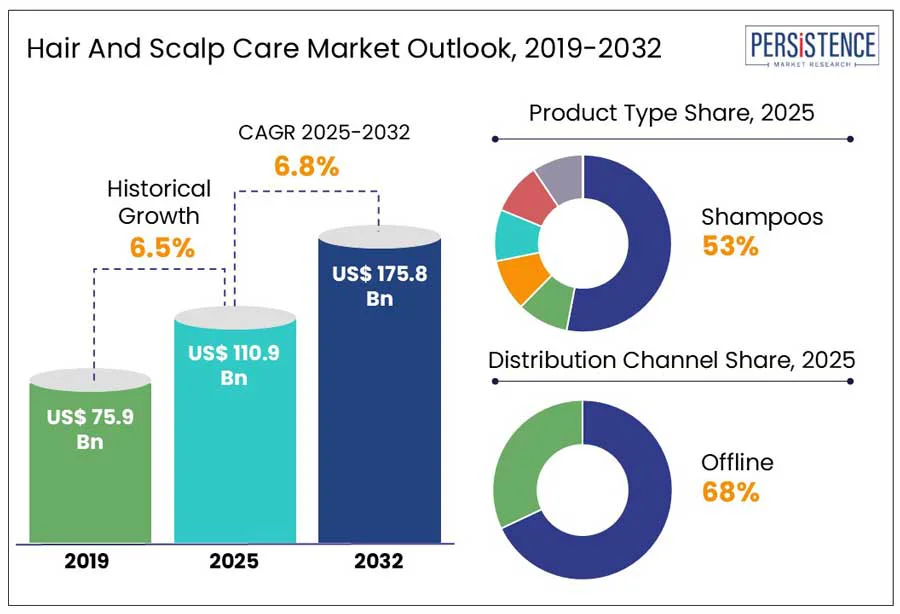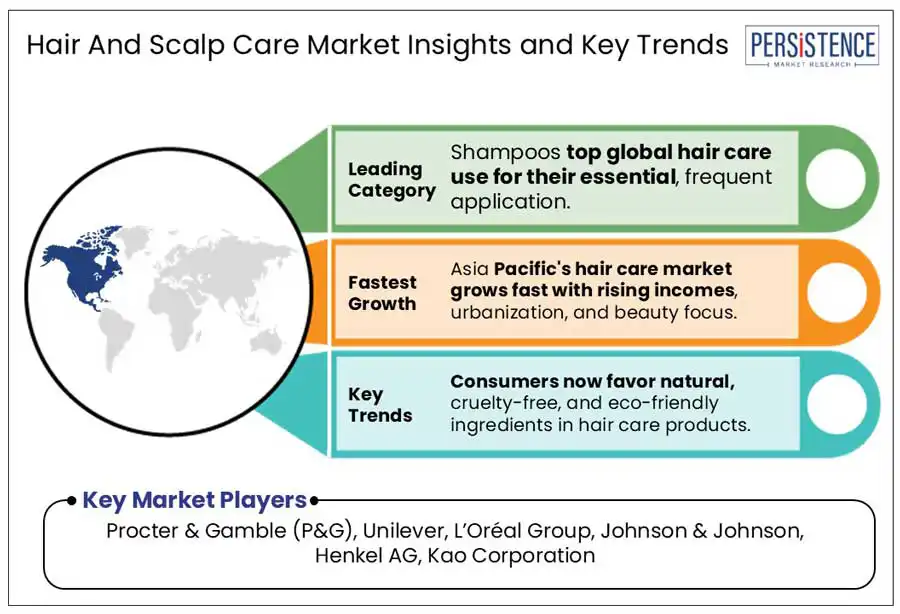ID: PMRREP35355| 190 Pages | 28 May 2025 | Format: PDF, Excel, PPT* | Consumer Goods

The global hair and scalp care market size is anticipated to rise from US$ 110.9 Bn in 2025 to US$ 175.8 Bn by 2032, witnessing a CAGR of 6.8% from 2025 to 2032. According to the Persistence Market Research report, the industry is experiencing rapid growth as consumers increasingly prioritize their hair and scalp health. Fueled by a rising demand for natural, sustainable ingredients, consumers are now more conscious of the products they use, favoring those that align with personal wellness and environmental concerns.

Key Industry Highlights:
|
Global Market Attribute |
Key Insights |
|
Hair and Scalp Care Market Size (2025E) |
US$ 110.9 Bn |
|
Market Value Forecast (2032F) |
US$ 175.8 Bn |
|
Projected Growth (CAGR 2025 to 2032) |
6.8% |
|
Historical Market Growth (CAGR 2019 to 2024) |
6.5% |
As consumers become more aware of the vital role scalp health plays in overall hair vitality, there is a noticeable shift towards specialized products that target common scalp concerns such as dandruff, dryness, oiliness, and irritation.
Anti-dandruff shampoos, scalp exfoliators, and nourishing scalp serums are gaining popularity, as they address these issues while promoting healthier hair growth. The growing recognition of the scalp's importance in maintaining healthy, strong hair drives demand for products that provide tailored solutions. In 2024, scalp care videos on TikTok have been viewed more than 2.6 billion times. Google searches for “silicone scalp massager” increased by 250% in Australia alone over the past year.
This increased consumer focus on scalp care is fueling innovation in the market, encouraging brands to develop advanced formulations designed for specific scalp conditions. In November 2024, Vichy Dercos launched its advanced scalp care line in the U.S., featuring a three-step system: Selenium Sulfide Anti-Dandruff Shampoo, Hair + Scalp Moisturizing Conditioner, and Salicylic Acid Anti-Dandruff Serum. Formulated with niacinamide and glycerin, these products aim to address dandruff, dryness, and irritation, offering both therapeutic and cosmetic benefits.
As consumers become increasingly knowledgeable about the ingredients in their beauty products, there is a noticeable shift toward natural, organic, and chemical-free alternatives. Traditional hair care products often contain sulfates, parabens, silicones, and synthetic fragrances, which have raised concerns about their potential long-term effects on hair and scalp health. These harsh chemicals can lead to dryness, irritation, and even hair damage. In response to these concerns, many consumers seek safer, gentler products free from harmful additives. As of March 2025, nearly 12,000 lawsuits have been filed in the U.S. District Court for the Northern District of Illinois, alleging that chemical hair relaxers caused uterine cancer and other health issues.
The U.S. Food and Drug Administration (FDA) has proposed a ban on hair-straightening products containing formaldehyde, a known carcinogen, due to its link to cancer and other long-term adverse health effects.
As a result, brands are innovating and developing cleaner, eco-friendly formulations, aligning with the growing demand for sustainable and non-toxic beauty solutions.
Vegan hair care products, which are free from animal-derived ingredients and cruelty-free testing, are increasingly aligning with consumers' growing desire for sustainability and ethical practices.
This trend has gained significant traction among younger generations, particularly Millennials and Gen Z, who value plant-based, natural alternatives in their beauty routines. These consumers are more likely to research product ingredients and avoid brands that use harmful chemicals or contribute to animal testing. As a result, companies offering vegan hair care solutions can appeal to this socially conscious demographic, fostering customer loyalty and brand trust.
In October 2024, Djerf Avenue Beauty launched a new shampoo, conditioner, and hair mask under its brand, all of which are vegan, PETA-certified, cruelty-free, sulfate-free, paraben-free, and silicone-free, with packaging made from 100% post-consumer recycled materials. In 2024, Blake Lively, a famous Hollywood actress, launched her vegan hair care line, Blake Brown, on August 4, 2024, exclusively at Target. The collection, developed over seven years, includes eight products such as shampoos, masks, and styling treatments, all priced under US$25. Inspired by high-end brands but designed to be more accessible, Blake Brown emphasizes clean, cruelty-free ingredients and sustainable packaging. This positions brands to not only expand their market share but also strengthen their reputation in an increasingly eco-aware market.
Shampoos remain the most consumed hair care product globally, largely due to their frequent and essential use. As a daily staple in personal care routines, shampoos are formulated to cater to various hair types, concerns, and preferences, driving widespread adoption. Innovations in formulations, such as sulfate-free, organic, vegan, and moisture-enhancing options, continue to expand the market. Consumers are increasingly seeking products tailored to specific hair needs, such as dandruff control, color protection, or hydration. This growing demand for specialized shampoos, combined with rising awareness of scalp health, reinforces their dominance in the global hair care market.
In February 2024, Truth & Hair launched a hair care line tailored for straight, wavy, and curly hair types. The brand emphasizes the "skinification of hair," treating scalp health with the same importance as skincare. Their approach aims to address the root causes of hair issues, focusing on nourishment and prevention rather than just symptoms. In January 2024, Nykaa Naturals launched its Rosemary & Naturally Derived Niacinamide Sulphate-Free Haircare Range. This collection includes a shampoo and hair mask designed to enhance hair growth and density. The formulations are free from sulfates, parabens, and silicones, catering to consumers seeking clean beauty solutions.
Natural hair care ingredients, such as rosemary, argan oil, aloe vera, and tea tree oil, are gaining popularity due to their therapeutic benefits. Consumers are becoming more conscious of the potential harms of synthetic chemicals, seeking natural alternatives that promote healthier hair and scalp. These ingredients are known for their nourishing, soothing, and healing properties. As a result, brands are increasingly incorporating natural ingredients into their formulations, creating a surge in demand for plant-based, chemical-free products. This shift reflects the growing preference for sustainable, eco-friendly, and health-conscious hair care solutions. L’Oréal’s Botanicals Fresh Care line, launched in response to the clean beauty trend, features plant-based ingredients such as coriander, safflower, and ginger. This product range is free from parabens, silicones, and dyes, targeting consumers who prefer natural formulations.
Jean-Claude Biguine's RAISE line features products infused with a 5 Plant Protein Infusion, including rice, soy, and corn proteins. Aimed at repairing and strengthening hair, this line reflects salon expertise and natural formulation.

In North America, the hair and scalp care market is witnessing a strong shift toward clean, personalized, and clinically backed solutions. Consumers are increasingly opting for natural, vegan, and dermatologist-tested products that cater to specific hair concerns such as scalp sensitivity, hair thinning, and frizz.
The region's high digital penetration has fueled the growth of direct-to-consumer brands and AI-based hair analysis platforms, enabling tailored product recommendations. Ulta Beauty expanded its digital toolkit with a generative AI-powered hair try-on tool, designed to make online beauty shopping more interactive and personalized. Using Nvidia's advanced AI technology, the feature allows users to upload a photo, take a quick selfie, or use a model's image to see how different hair transformations might look.
Furthermore, rising awareness around scalp health as part of holistic wellness drives demand for scalp serums, exfoliators, and pre-shampoo treatments, especially among millennials and Gen Z who seek transparency and efficacy in formulations.
In Europe, the hair and scalp care market is driven by a strong emphasis on sustainability, ingredient transparency, and regulatory compliance. Consumers are increasingly favoring eco-friendly packaging, biodegradable formulas, and cruelty-free certifications, reflecting a region-wide commitment to environmental responsibility. The demand for organic and locally sourced ingredients is also rising with a growing preference for minimalist, non-toxic formulations.
European shoppers, particularly from Germany, France, and the Nordics, prioritize functional beauty with ethical sourcing. Joico launched the InnerJoi Haircare Line which boasts 86% to 98% naturally-derived ingredients. The line is PETA-approved and features recyclable packaging aligning with the growing consumer preference for cruelty-free and sustainable beauty products. Additionally, the aging population contributes to the growth of products targeting hair loss and scalp rejuvenation, fueling innovation in botanical-based treatments.
In Asia Pacific, the hair and scalp care market is expanding rapidly due to rising disposable incomes, urbanization, and increasing beauty consciousness. Consumers are embracing traditional herbal ingredients such as neem, ginseng, shikakai, and rice water, blending Ayurvedic and K-beauty philosophies with modern formulations. There is growing interest in scalp-focused routines, such as exfoliation and essence-based care, especially in markets like South Korea, Japan, and India.
Indus Valley introduced its 100% Botanical Aqua Hair Colour in 2024, formulated with natural ingredients such as henna and indigo. This product caters to consumers seeking chemical-free hair coloring solutions, emphasizing the brand's commitment to organic and herbal formulations. Additionally, the influence of social media and beauty influencers has heightened demand for natural, sulfate-free, and multifunctional products. E-commerce growth and regional brand innovations are accelerating product accessibility and personalization across diverse hair textures and concerns.
The global hair and scalp care market features intense competition marked by continuous innovation, niche product development, and regional customization. Brands are differentiating themselves through clean-label claims, multifunctional benefits, and specialized offerings like scalp serums, exfoliators, and pre-shampoo treatments. Companies are heavily investing in R&D to incorporate natural, vegan, and clinically backed ingredients, while leveraging AI and DTC models to personalize consumer experiences.
Sustainability, cruelty-free certifications, and ethical sourcing have become key brand differentiators, particularly in Europe and North America. In Asia Pacific, traditional herbal formulations integrated with modern science are gaining prominence, pushing companies to localize formulations for diverse hair needs.
The global hair and scalp care market is projected to value at 110.9 bn in 2025.
The hair and scalp care market is driven by increasing consumer awareness of scalp health, for targeted treatments like anti-dandruff shampoos and scalp serums.
The hair and scalp care market is poised to witness a CAGR of 6.8% between 2025 and 2032.
The growing preference for organic and vegan hair care products is the key market opportunity.
Major players in the hair and scalp care market include Procter & Gamble (P&G), Unilever, L’Oréal Group, Johnson & Johnson, Henkel AG, Kao Corporation, and others.
|
Report Attribute |
Details |
|
Historical Data/Actuals |
2019 - 2024 |
|
Forecast Period |
2025 - 2032 |
|
Market Analysis Units |
Value: US$ Bn/Mn, Volume: As applicable |
|
Geographical Coverage |
|
|
Segmental Coverage |
|
|
Competitive Analysis |
|
|
Report Highlights |
|
|
Customization and Pricing |
Available upon request |
By Product Type
By Ingredient Type
By End-user
By Distribution Channel
By Region
Delivery Timelines
For more information on this report and its delivery timelines please get in touch with our sales team.
About Author